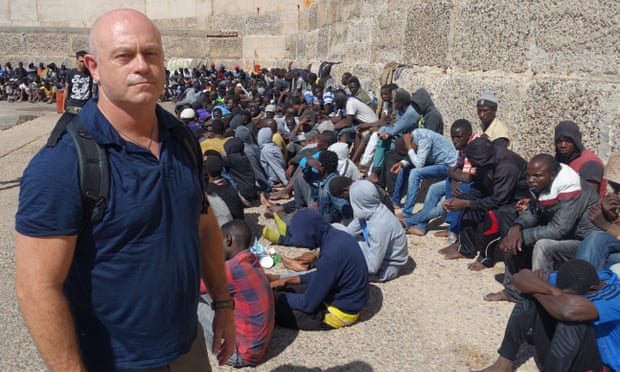I’ve seen the dangerous route to Europe through Libya, with thousands of people at the mercy of cruelty for profit. But our leaders prefer to keep them there
‘We have a heightened responsibility towards Libya because of the role Britain played in bringing down the Gaddafi dictatorship.’ Photograph: Dave Williams/Sound Ltd
It’s a mass grave that we don’t need the United Nations to verify. Every day an average of 14 migrants, the vast majority from countries in sub-Saharan Africa, die crossing the Mediterranean. Many more see their European dream turn into a nightmare long before they’re corralled on to flimsy rubber dinghies on Libya’s beaches. They’re the victims of a silent massacre in the Sahara desert – a journey more deadly than the crossing from the coast, according to the International Organisation for Migration
Come the spring, thousands of migrants and refugees fleeing poverty and violence will die in Libya, but I doubt you’ll hear much about it. Compassion fatigue has set in. The numbers have become too big to comprehend. It’s an old story; we feel numbed by the now familiar news images of men huddled together on boats. Maybe it’s because they’re African and have been written off as “undeserving economic migrants”. These are the people some of our political leaders have in mind when they talk of swarms, plagues and marauders. The understandable focus on Syrian refugees has taken the spotlight away from the more dangerous route to Europe through Libya.
Or maybe it’s because, with three rival governments presiding over anarchy in Libya, and the real power lying in the hands of armed militias, getting inside the country to tell the story is just too difficult and dangerous. One thing is becoming clear – many people have come to see this tragic situation as though it were more a problem for us than for the migrants. We have stopped caring about them. As a documentary-maker, I believe it’s our job to make people care. That was the reason my team and I went to Libya – to try to shine a light on the under-reported plight of migrants away from the coastline and to tell the human stories of the men and women making the journey.‘What I saw there is nothing short of a modern-day slave trade.’
What I saw there is nothing short of a modern-day slave trade, with migrants treated as commodities. It’s as though nothing has changed in the 300 years since desert tribes used the very same routes to bring slaves to north Africa: Nigerian women told they are going to Italy to work as housemaids only to be trafficked into desert brothels with no idea when they might leave, young men cruelly beaten and held captive for months until their families pay a ransom, women forced to take contraception to stop themselves becoming pregnant at the hands of smugglers.
Continue: https://www.theguardian.com/commentisfree/2017/feb/20/migrant-slave-trade-libya-europe
Wellicht is mijn boekenblog ook interessant: http://dutchysbookreviews.blogspot.nl/l
Interessant artikel? Deel het eens met uw netwerk en help mee met het verspreiden van de bekendheid van dit blog. Er staan wellicht nog meer artikelen op dit weblog die u zullen boeien. Kijk gerust eens rond. Zelf graag wat willen plaatsen? Mail dan webmaster@vreemdelingenrecht.com In verband met geldwolven die denken geld te kunnen claimen op krantenartikelen die op een blog als deze worden geplaatst maar na meestal een dag voor de krantenlezers aan leeswaardigheid hebben ingeboet terwijl wij vreemdelingenrecht specialisten ze soms wel nog jaren gebruiken om er een kopie van te maken voor een zaak ga ik over tot het plaatsen van alleen het eerste stukje. Ja ik weet het: de kans dat u doorklikt is geringer dan wanneer het hele artikel hier staat en een kopie van het orgineel maken handig kan zijn voor uw zaak. Wilt u zelf wat overnemen van dit weblog. Dat mag. Zet er alleen even een link bij naar het desbetreffende artikel zodat mensen niet alleen dat wat u knipt en plakt kunnen lezen maar dat ook kunnen doen in de context.
Subscribe to Vreemdelingenrecht.com blog by Email





Geen opmerkingen:
Een reactie posten